

Ma Ka Hana Ka ʻIke—a building program for at-risk youth in Hana, Maui. Legal status of Hawaii. The legal status of Hawaii—as opposed to its political status—is a subject of scholarly and legal debate.
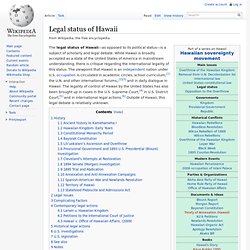
While Hawaii is broadly accepted as a state of the United States of America in mainstream understanding, there is critique regarding the international legality of this status. The viewpoint that Hawaii is an independent nation under U.S. occupation is circulated in academic circles, school curriculum;[1] the U.N. and other international forums,;[2][3] and in daily dialogue in Hawaii. The legality of control of Hawaii by the United States has also been brought up in cases in the U.S. Supreme Court,[4] in U.S. District Court,[5] and in international legal actions.[6] Outside of Hawaii, this legal debate is relatively unknown.
History[edit] Ancient history to Kamehameha I[edit] For many centuries, the island chain we now know as "Hawaii" was governed by interrelated chiefdoms based upon the ahupuaʻa system of land management. Hawaiian Kingdom: Early Years[edit] Bayonet Constitution[edit] Civil Code of the Hawaiian Islands - ARTICLE X. §458.
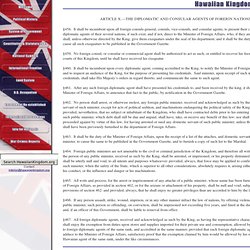
It shall be incumbent upon all foreign consuls-general, consuls, vice-consuls, and consular agents, to present their commissions through the diplomatic agents of their several nations, if such exist, and if not, direct to the Minister of Foreign Affairs, who, if they are found to be regular, shall, unless otherwise directed by the King, give them exequaturs under the seal of his department; and it shall be the duty of said minister to cause all such exequaturs to be published in the Government Gazette. §459. No foreign consul, or consular or commercial agent shall be authorized to act as such, or entitled to recover his fees and perquisites in the courts of this Kingdom, until he shall have received his exequatur. §460.
Penal Code of the Hawaiian Islands - Index by Chapters. Civil Code of the Hawaiian Islands - Table of Contents. Title 1––Of Laws (PDF) Chapter I.
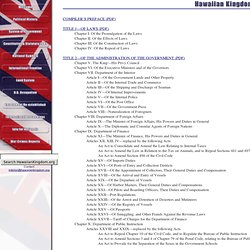
HAWAII - INDEPENDENT & SOVEREIGN. Nation of Hawaiʻi (organization) The Nation of Hawaiʻi is a Hawaiian independence organization headed by Dennis Pu‘uhonua "Bumpy" Kanahele.
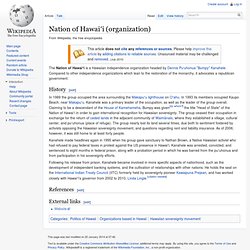
Compared to other independence organizations which lean to the restoration of the monarchy, it advocates a republican government. In 1989 the group occupied the area surrounding the Makapuʻu lighthouse on Oʻahu. In 1993 its members occupied Kaupo Beach, near Makapuʻu. Ka Lahui Hawaii. Haunani-Kay Trask : Native Hawaiian Speaker and Professor.
Mililani Trask. Mililani Trask is a leader of the Hawaiian Sovereignty Movement and a political speaker and attorney.
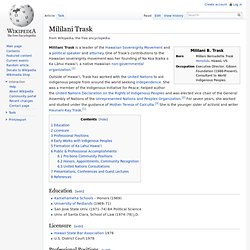
One of Trask's contributions to the Hawaiian sovereignty movement was her founding of Na Koa Ikaika o Ka Lāhui Hawaiʻi, a native Hawaiian non-governmental organization.[1] Outside of Hawaiʻi, Trask has worked with the United Nations to aid indigenous people from around the world seeking independence. She was a member of the Indigenous Initiative for Peace, helped author the United Nations Declaration on the Rights of Indigenous Peoples and was elected vice chair of the General Assembly of Nations of the Unrepresented Nations and Peoples Organization.[2] For seven years, she worked and studied under the guidance of Mother Teresa of Calcutta.[3] She is the younger sister of activist and writer Haunani-Kay Trask.[1] Education[edit] Licensure[edit] Professional Positions[edit] Early Works with Indigenous Peoples[edit] In October 1993, Ms. In 1995, Ms. Ms. Ms.
From 1987-1998, Ms. In 2001, Ms. Haunani-Kay Trask : Native Hawaiian Speaker and Professor. Hawaiian sovereignty movement. The Hawaiian sovereignty movement (Hawaiian: ke ea Hawai‘i) is a political movement seeking some form of sovereignty for Hawai'i.
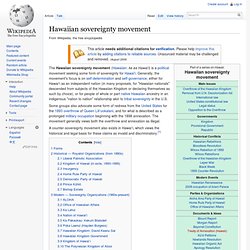
Generally, the movement's focus is on self-determination and self-governance, either for Hawaiʻi as an independent nation (in many proposals, for "Hawaiian nationals" descended from subjects of the Hawaiian Kingdom or declaring themselves as such by choice), or for people of whole or part native Hawaiian ancestry in an indigenous "nation to nation" relationship akin to tribal sovereignty in the U.S. Some groups also advocate some form of redress from the United States for the 1893 overthrow of Queen Liliʻuokalani, and for what is described as a prolonged military occupation beginning with the 1898 annexation. The movement generally views both the overthrow and annexation as illegal.
A counter-sovereignty movement also exists in Hawaiʻi, which views the historical and legal basis for these claims as invalid and discriminatory.[1] Forms[edit] Insurgency[edit] Polynesian Kingdom of Atooi. MAHEALANI with RICHARD FINE: The Sovereign Principality of Aloha. Kingdom of Hawaii PSA announcing END of US rule- formal re-instatement of Hawaiian Nation. Kalahui Hawaii: Documenting the State of Aloha. February 17, 2011 A new documentary presents the history and culture of Kalahui Hawaii showing how nascent American imperialism and commercial interests led to the end of Hawaiian independence.
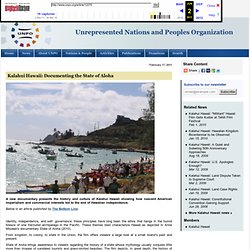
Below is an article published by The Bottom Line: Ited Nations News Centre - US must work to advance reconciliation with indigenous people – UN expert. 11 September 2012 – The United States must adopt new measures to advance a reconciliation process with its indigenous peoples and address historical wrongs that have stopped them from fully realizing their rights, a United Nations independent expert said today.
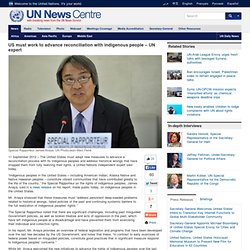
“Indigenous peoples in the United States – including American Indian, Alaska Native and Native Hawaiian peoples – constitute vibrant communities that have contributed greatly to the life of the country,” the Special Rapporteur on the rights of indigenous peoples, James Anaya, said in a news release on his report, made public today, on indigenous peoples in the United States. Mr. Anaya stressed that these measures must “address persistent deep-seeded problems related to historical wrongs, failed policies of the past and continuing systemic barriers to the full realization of indigenous peoples’ rights.”
In his report, Mr. While Mr. To develop his report, Mr. DisplayNews. Aloha Spirit Law. Together, we can make The Aloha Spirit as vibrant and real as it was for those who came before us.
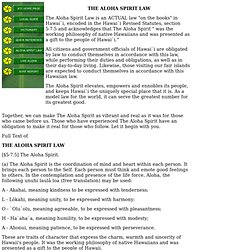
Those who have experienced The Aloha Spirit have an obligation to make it real for those who follow. Let it begin with you. [§5-7.5] The Aloha Spirit. (a) The Aloha Spirit is the coordination of mind and heart within each person. It brings each person to the Self. A - Akahai, meaning kindness to be expressed with tenderness; Hawaii is not legally a state! "The rule of law is simply the rule of bandits who are in control of the United States.

" -- Eustace Mullins Screening Paid advertising at What Really Happened may not represent the views and opinions of this website and its contributors. No endorsement of products and services advertised is either expressed or implied. Hawaii is not legally a state! It is easy to find the courage necessary to support a moral position if that position benefits oneself. The people of the United States find themselves in such a position right now, forced to choose between a moral and ethical position that carries with it the potential for "inconvenience", or supporting the status quo and having to admit to themselves that they are not the champions of justice they imagine themselves to be.
Hawaiian Kingdom - David Keanu Sai v. Barack Obama, et al. KANE`OHE, HAWAIIAN ISLANDS, JUNE 1, 2010 — Dr. David Keanu Sai, a national of the Hawaiian Kingdom, filed a complaint in U.S. District Court, Washington, D.C., against President Obama, Secretary of State Clinton, Secretary of Defense Gates, Pacific Command Commander Admiral Willard and State of Hawai`i Governor Lingle. The civil case was assigned no. 1:10-CV-00899CKK. Hawaiian Kingdom - International Proceedings. Kalahui Hawaii. March 25, 2008 Population: 1,2 millionLocation: Islands of Nihau, Kauai, Oahu, Molokai, Lanai, Kahoolawe. Maui and Hawaii. Ethnic Groups: Hawaii, Asian, Pacific Islander Created in 1987, after a Constitutional Convention, Ka Lahui Hawaii is committed to regaining their native lands and reestablishing Hawaiians as a self- governing people.